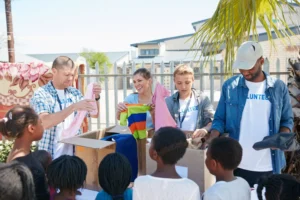During my 12 months in Haiti as a missionary, every day was a hot mess — but working with missions teams could be even messier.
I vividly remember one particular day when I sat with a visiting mission team in dusty, standstill traffic after a long day at the orphanage. As the sweat ran down my forehead, I thought again of how tap-taps (Haitian public transportation) are like tin ovens.
I was parched, and as if on cue, street vendors approached our vehicle, holding up $1 bottles of ice cold Coca-Cola. The team and I all eagerly reached for our wallets, but one team member pulled out a crisp, $20 bill and handed it to the vendor.
“You need this more than I do, don’t you?” she said, smiling. I cringed and spent the rest of the ride home thinking about why her words struck me so hard.
After the Lollipops and Face Paint
I like short-term missions trips. My dad took me on a missions trip to Ecuador as a teenager, and that trip set me on the path that eventually led to Haiti. God has used short-term missions to increase my love for both the community of believers and the communities they come to serve. So naturally, I loved the excitement of the dozens of mission teams I watched walk off the planes, pulsating with passion for ministry and Haiti. I loved that they came to serve, especially in a country that had become so dear to me. But I did not always love the way their efforts turned out.
Long after the lollipops and face paint were gone, I sometimes caught whiffs of frustration from the locals. The kids loved the treats and games, and the parents were always thankful for completed construction projects. And yet, somehow they weren’t as grateful as I imagined they would be.
Sometimes I perceived that the work done by the missions teams was dwarfed by the pressing, actual needs of the locals. So I began to wonder why those needs hadn’t been addressed — and could they have been?
What Jim Should Have Done
Take Jim, for example. Jim arrived at the orphanage eager to put his tools and electric drill to use. After touring the compound, he noticed a broken down washing machine lying forgotten in one of the back rooms. Eager to serve, Jim immediately undertook the project, and the machine was soon whirling and spinning once again. Jim was ecstatic, genuinely convinced that the washing machine would make a world of difference at the orphanage. It would save time, make washing practices more efficient, and free up hands for other tasks. The nannies were very impressed and thanked him profusely. But Jim would probably be dismayed to know that a few days after his departure, the nannies stopped using the machine altogether.
It wasn’t that they weren’t grateful — they were! They simply didn’t need a working washing machine. They were perfectly content to wash the clothes by hand — it was a social activity and a part of their culture that didn’t seem inefficient or wasteful at all. Plus, the electricity needed to run the machine would probably mean the children at the orphanage would go hungry sometimes to pay for it. The nannies never told Jim that they didn’t want a washing machine. But on the other hand, Jim never stopped to ask.
The One Thing You Can Always Do
Jim’s story deeply saddened me as I watched it play out again and again with other teams. But it did not leave me without hope, as I’ve come to believe that there is a simple, practical piece of wisdom that can be applied to anyone who goes to another culture to provide short-term help: Ask.
Ask the locals what they need. Ask selflessly, willing to serve in ways that aren’t fun, exciting, planned or even logical. Ask in humility, willing to learn about the local culture. Ask with a spirit of cheerful camaraderie, partnering with your brothers and sisters around the world to bear their burdens. Let yourself and your team be advised by the ones who are already on the ground, in the daily grind.
One of the first and more powerful lessons that I learned within weeks of touching down in Port-au-Prince was that Haiti needs Haitians first. And then they need missionaries to partner with them relationally, rather than reflexively stepping in to do a project or give money.
We must be willing to spend the time to learn from, relate to and partner with the people we are helping. Effective aid does not always mean our extra $20 or handyman skills. Sometimes it means setting those things aside to ask what is really needed.
 Margaret Hebda lives and works in the Washington, D.C., area where she advocates for orphans through adoption and remains passionate to speak up for those who cannot speak for themselves.
Margaret Hebda lives and works in the Washington, D.C., area where she advocates for orphans through adoption and remains passionate to speak up for those who cannot speak for themselves.










